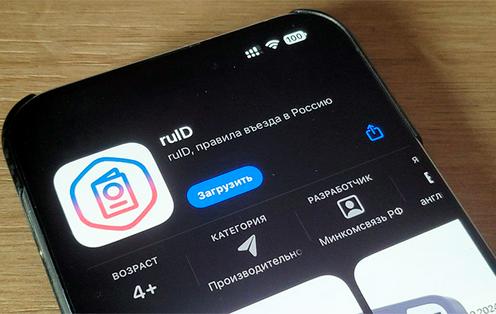Russia’s Ministry of Digital Development, Communications and Mass Media has launched a multilingual mobile app for foreign nationals called ruID. The app allows users to submit a pre-arrival declaration, check entry restrictions, and create a digital profile for accessing Russian government services, the ministry’s press office reported.
The app is part of a pilot program aimed at testing new procedures for entry and exit of foreign nationals and stateless persons from countries that have visa-free regimes with Russia. If the pilot is deemed successful, relevant Russian legal acts will be amended to codify the new entry framework.
ruID is available in seven languages: English, Armenian, Kazakh, Kyrgyz, Russian, Tajik, and Uzbek. It can be downloaded from RuStore, Google Play, AppGallery, and the App Store.
To register, users must provide an email address, a personal photo, a photo of a valid ID, and a voice recording. A Russian phone number is not required. Travelers must submit their trip purpose at least 72 hours before crossing the border (or in exceptional cases, at least 4 hours before).
According to the ministry, the pre-arrival declaration is not required for citizens of Belarus, children under 6, diplomats and staff of foreign missions, employees of international organizations and their family members.
Each declaration is valid for 90 days from the date of submission.
At the border, officials will verify the data and generate a digital profile, issue a SNILS (individual insurance account number), and create a standard account on Russia’s “Gosuslugi” public services portal—necessary, for example, to obtain a Russian SIM card.
The Russian Embassy in Kazakhstan emphasized that filling out the ruID declaration remains optional:
“We highlight that filling out the declaration via the ruID app is voluntary as part of the pilot program. Not having a declaration will not affect border control procedures,” the embassy stated on its website.
However, the Russian government’s official documentation on ruID appears to contradict this. The published rules specify that participation in the experiment is mandatory for foreign nationals and stateless persons.
Starting June 30, 2025, all foreign nationals entering Russia through any border checkpoint will be required to provide fingerprints and facial biometrics. This biometric data collection began as a pilot in December 2024 at four Moscow airports—Domodedovo, Sheremetyevo, Vnukovo, and Zhukovsky—and at the Mashatovo automobile checkpoint in Orenburg Region on the border with Kazakhstan. The new rules will apply nationwide from the end of June.
Digital Development Minister Maksut Shadayev commented that the procedure mirrors the biometric requirements for Schengen visas and is intended to enhance national security. The policy has prompted speculation that Russia is effectively introducing a visa-like regime for countries with which it maintains visa-free travel agreements, including many in Central Asia.
The biometric mandate is part of a broader tightening of Russia’s immigration policies. Recent laws have introduced limits on the number of SIM cards foreigners may own and established a special expulsion regime for migration violations.










